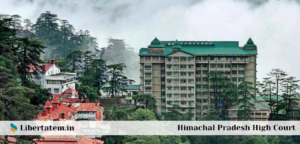In the case of Ajay Kumar v. State of Himachal Pradesh, a bail petition was filed under Section 439 of Cr.PC in the High Court of Himachal Pradesh, prayer has been made on behalf of the bail petitioner for grant of regular bail in the case under Sections 376 and 506 of IPC and Section 67 of Information Technology Act.
Petitioner’s Arguments
The Learned Deputy Advocate General, Mr. Kunal Thakur, on instructions of the Investigating Officer, who was present in Court, fairly stated that the “investigations in the instant case is now complete and hence custodial interrogation of the petitioner is not required.” He on the instructions of Investigating Officer also stated that State has no objection in case, the petitioner is ordered to be enlarged on bail subject to the condition that he shall always make himself available as and when required by the Investigating Agency for any kind of investigation.
The Counsel also marked the judgment in the case of Dataram Singh vs. State of Uttar Pradesh & Anr., in which the court held that
“A fundamental postulate of criminal jurisprudence is the presumption of innocence, meaning thereby that a person is believed to be innocent until found guilty. However, there are instances in our criminal law where a reverse onus has been placed on an accused with regard to some specific offences but that is another matter and does not detract from the fundamental postulate in respect of other offences. Yet another important facet of our criminal jurisprudence is that the grant of bail is the general rule and putting a person in jail or in a prison or in a correction home (whichever expression one may wish to use) is an exception. Unfortunately, some of these basic principles appear to have been lost sight of with the result that more and more persons are being incarcerated and for longer periods. This does not do any good for our criminal jurisprudence or to our society.”
The petitioner, Mr. HC Dev Raj, assured the Hon’ble court to be present in any kind of proceedings of the investigation agency or the court and accepts to sign the Bail Bond of Rs.50,000/- as directed by the court.
Defendant’s Arguments
The learned counsel from respondent’s side, Advocate Mr. Rajesh Kumar Parmar pleaded that
“There is no doubt that the grant or denial of bail is entirely the discretion of the judge considering a case but even so, the exercise of judicial discretion has been circumscribed by a large number of decisions rendered by this Court and by every High Court in the country. Yet, occasionally there is a necessity to introspect whether denying bail to an accused person is the right thing to do on the facts and in the circumstances of a case.”
Also, he said that needless to say the object of the bail is to secure the attendance of the accused in the trial and the proper test to be applied in the solution of the question that whether bail should be granted or refused is whether it is probable that the party will appear to take his trial or not?
Court’s Decision
The court held that
“Needless to say the object of the bail is to secure the attendance of the accused in the trial and the proper test to be applied in the solution of the question whether bail should be granted or refused is whether it is probable that the party will appear to take his trial.”
 In view of the aforesaid discussion as well as law laid down by the Hon’ble Apex Court, petitioner has carved out a case for grant of bail, accordingly, the petition is allowed and the petitioner is ordered to be enlarged on bail in the aforesaid FIR, subject to his furnishing personal bond in the sum of Rs.50,000/- each with one surety in the like amount to the satisfaction of concerned Chief Judicial Magistrate/Trial Court, with following conditions:
In view of the aforesaid discussion as well as law laid down by the Hon’ble Apex Court, petitioner has carved out a case for grant of bail, accordingly, the petition is allowed and the petitioner is ordered to be enlarged on bail in the aforesaid FIR, subject to his furnishing personal bond in the sum of Rs.50,000/- each with one surety in the like amount to the satisfaction of concerned Chief Judicial Magistrate/Trial Court, with following conditions:
(a) He shall make himself available for the purpose of interrogation, if so required and regularly attend the trial Court on each and every date of hearing and if prevented by any reason to do so, seek exemption from an appearance by filing an appropriate application.
(b) He shall not tamper with the prosecution evidence nor hamper the investigation of the case in any manner whatsoever.
(c) He shall not make any inducement, threat or promises to any person acquainted with the facts of the case so as to dissuade him/her from disclosing such facts to the Court or the Police Officer.
(d) He shall not leave the territory of India without the prior permission of the Court.
Hence, it is clarified that if the petitioner misuses the liberty or violates any of the conditions imposed upon him, the investigating agency shall be free to move this Court for cancellation of the bail.
Libertatem.in is now on Telegram. Follow us for regular legal updates and judgements from the court. Follow us on Google News, Instagram, LinkedIn, Facebook & Twitter. You can also subscribe for our Weekly Email Updates. You can also contribute stories like this and help us spread awareness for a better society. Submit Your Post Now.

